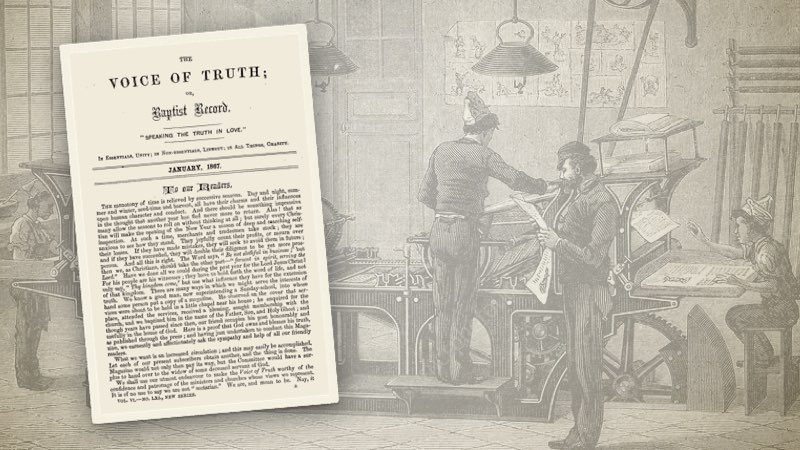
Precious Faith
The Voice Of Truth 1865:
Extract From A Sermon, Preached By Mr. G. Cook, Of Salem Chapel, Braintree.
This we have not by nature. So far are we from being capable of faith in Christ, in a state of unregeneracy, that it is altogether contrary to our nature. God created Adam holy, and placed him in the garden of Eden in a state of sinless perfection; but he by disobedience merited the displeasure of Heaven, and being the head of the covenant of works, plunged not only himself, but the whole human race into a state of sin, degradation, misery, and death; and the word of God declares us all to be sinners of the deepest dye—dead in trespasses and sins, and blinded by the god of this world. We are all like sheep gone astray; and so fallen are we, that by nature we have no knowledge of the Creator, nor love to Christ, nor faith in him. And having lost the image of God, and purity of heart, we mock at sin, laugh at salvation, prefer time to eternity, prepare for the body and neglect the soul, choose the service of Satan, and live without God or hope in the world.
Or will you look at humanity—fallen humanity, in its most reformed character; can you find anything in it that at all resembles the faith of God’s elect? We may, it is true, possess a sound creed, and perform certain duties; but it is one thing to have a “form of godliness,” and another to be living under the power of godliness. It is one thing to have notions in the head, and another to have vital religion in the soul. It is one thing to perform certain duties, and live under certain restrictions, and another to be drawn into the path of obedience by the love of God shed abroad in the heart.
An d farther; we are assured that faith is the gift of God. We contend, therefore, that faith is not inherent in us, but is divine in its origin,—a free gift, a gift of grace, which is infused into the soul by the irresistible, effectual working of God the Holy Ghost in regeneration.
This faith distinguishes the Christian from the Christless, and is a grace of the Spirit, the companion of patience, the substance of things hoped for, the evidence of things not seen, which works by love, and is the heart of spiritual vitality.
By this faith we embrace the Saviour, receive the blood, walk with God, sour to worlds unknown, read our names in the Lamb’s book of life, subdue kingdoms, refuse the pleasures of sin, choose the path of affliction, worship God, obtain a good report, obey the law of love, embrace the promises, despise the wrath of men, prevail with heaven, work righteousness, conquer the armies of hell, refute error, are strong in the Lord, stand in temptation, endure hardships, rejoice in tribulation, smile at disappointments, wield the sword of the Spirit, deny ourselves, feast on eternal verities, abide in Christ, read our titles clear to mansions in the skies, stand on Pisgah’s top and view the landscape o’er, bear heavy burdens, and long for the rest that remains for the people of God.
Our apostle says: “We walk by faith,” from the city of destruction, in the way, which is called the way of holiness, through the swellings of Jordan, to the place where the wicked cease from troubling, and where the weary are at rest.
It may be argued the Strict and Particular Baptist churches of the 17th, 18th and early 19th centuries were at their strongest when they remained independent congregations, unaffiliated with Magazines and Societies. This strength was lost during the latter half of the 19th century when the churches clamored around favorite periodicals and regional associations. Although the Magazines were largely responsible for creating a party-spirit and culpable for stirring up needless controversy, they nevertheless contain many valuable resources which may prove a blessing for this generation. Although they differed on various points of doctrine, they invariably held to high views of sovereign grace, denouncing as heresy the pernicious teachings of Andrew Fuller. The majority of Strict and Particular Baptist churches during the 18th and 19th centuries were Hyper-Calvinists.



